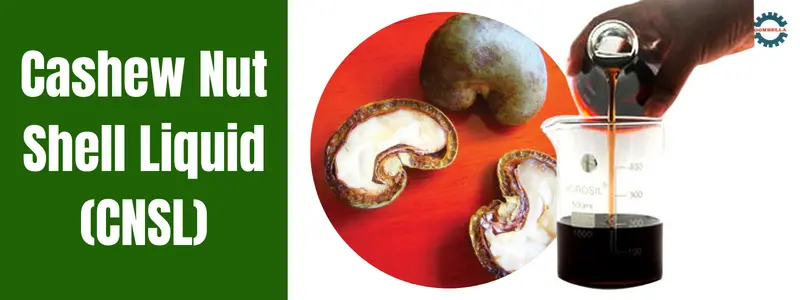-
-
Suite 1, Floor 2, Wing C, Alhaji Adenekan Plaza, Okota Road, Isolo, Lagos State, Nigeria
Blog Details

11
JanUnlocking the Potency: Cashew Nut Shell Liquid (CNSL) in Agricultural Alchemy
Unlocking the Potency: Cashew Nut Shell Liquid (CNSL) in Agricultural Alchemy
Contents
- 1 Unlocking the Potency: Cashew Nut Shell Liquid (CNSL) in Agricultural Alchemy
- 1.1 Understanding the Essence of Cashew Nut Shell Liquid CNSL
- 1.2 Methods of Extraction
- 1.3 Natural CNSL vs. Technical CNSL
- 1.4 CNSL as a Source for Phenolic Components
- 1.5 Applications in Thermoset Resins
- 1.6 Biocomposites: Reinforcing the Future with CNSL
- 1.7 In Conclusion: A Liquid Alchemy of Agriculture and Industry
In the realm of cashew nut and cashew apple production, one often-overlooked gem emerges – Cashew Nut Shell Liquid (CNSL). This dark brown viscous liquid, residing within the intricate honeycomb structure of the cashew nutshell, stands as a testament to the resourcefulness of the cashew nut tree (Anacardium occidentale). As we embark on a journey through the chemistry and applications of CNSL, the depth of its significance unfolds, reaching beyond agriculture into the realms of industry and innovation.
Understanding the Essence of Cashew Nut Shell Liquid CNSL
The composition of CNSL, akin to an alchemical formula, unveils a fascinating blend of phenolic compounds with aliphatic side chains. Breaking down the enigma, CNSL consists of 70% anacardic acid, 5% cardanol, and 18% cardol. These components, with their distinct properties, set the stage for CNSL’s versatility and applicability.
Methods of Extraction
CNSL, the pericarp fluid of the cashew nut, is extracted through several methods, each imparting its unique fingerprint to the liquid gold. The hot oil process, solvent extraction (utilizing methods like soxhlet, supercritical carbon dioxide, or subcritical water), mechanical extraction, vacuum distillation, and supercritical fluids processes all play a role in obtaining this precious substance. Notably, local roasting, a traditional method, coaxes CNSL out from the shell, infusing it with regional nuances.
Natural CNSL vs. Technical CNSL
The journey of CNSL diverges into two distinct compositions – Natural CNSL and Technical CNSL (tCNSL). Natural CNSL, obtained through solvent extraction techniques under mild conditions, preserves the integrity of its constituents without inducing chemical modifications. On the flip side, tCNSL, a source for phenolic compounds in the synthesis of phenol/formaldehyde polymers, undergoes an automated process involving high temperatures, ensuring extraction efficiency for industrial purposes.
CNSL as a Source for Phenolic Components
CNSL, with its aromatic richness, not only presents itself as a valuable agricultural byproduct but transcends into the realm of industry and chemistry. The aromatic and phenolic compounds within CNSL engage in a symphony with formaldehyde, giving birth to condensation polymers – resole and novolac. These polymers serve as excellent matrix resins for composites, offering a myriad of applications in manufacturing.
Applications in Thermoset Resins
The unique composition of CNSL, particularly its aromatic and phenolic compounds, positions it as a cornerstone for thermoset resins. Novalac CNSL formaldehyde resins, with their long hydrocarbon chains, bring flexibility to the table, surpassing conventional phenolic resins. These resins find application in surface coatings, delivering not only flexibility but also high chemical resistance.
Biocomposites: Reinforcing the Future with CNSL
The marriage of CNSL with natural fibers in the creation of biocomposites marks a promising avenue in material science. From oil palm fibers to sisal, kenaf, hemp bast, jute, and coconut coir fibers, CNSL-based thermosets find reinforcement, creating materials with diverse mechanical properties. The table below illustrates the mechanical prowess of selected CNSL-based composites:
| CSNL Resin Type | Reinforcement | Modulus [GPa] | Strength [MPa] |
| Novalac | Hemp | 13 (F) | 91 (F) |
| Novalac | Kenaf | 17 (F) | 166 (F) |
| Resol | Coir | 10.5 (T) | 6.42 (T) |
| Resol | Coir | 16.9 (T) | 13.45 (T) |
| Resol | Jute | 20.4 (T) | 18.21 (T) |
| Resol | Jute | – | 6.56 (T) |
In Conclusion: A Liquid Alchemy of Agriculture and Industry
In the final analysis, Cashew Nut Shell Liquid (CNSL) emerges not only as an agricultural byproduct but as a cornerstone in the realms of industry and innovation. From its diverse composition to applications in thermoset resins and biocomposites, CNSL unlocks a realm of possibilities. As we navigate the intricate honeycomb of the cashew nutshell, we witness the transformation of a humble liquid into a versatile agent of alchemy, shaping the landscape of agriculture and manufacturing alike.
Author's Details
gombella
Other posts by gombella